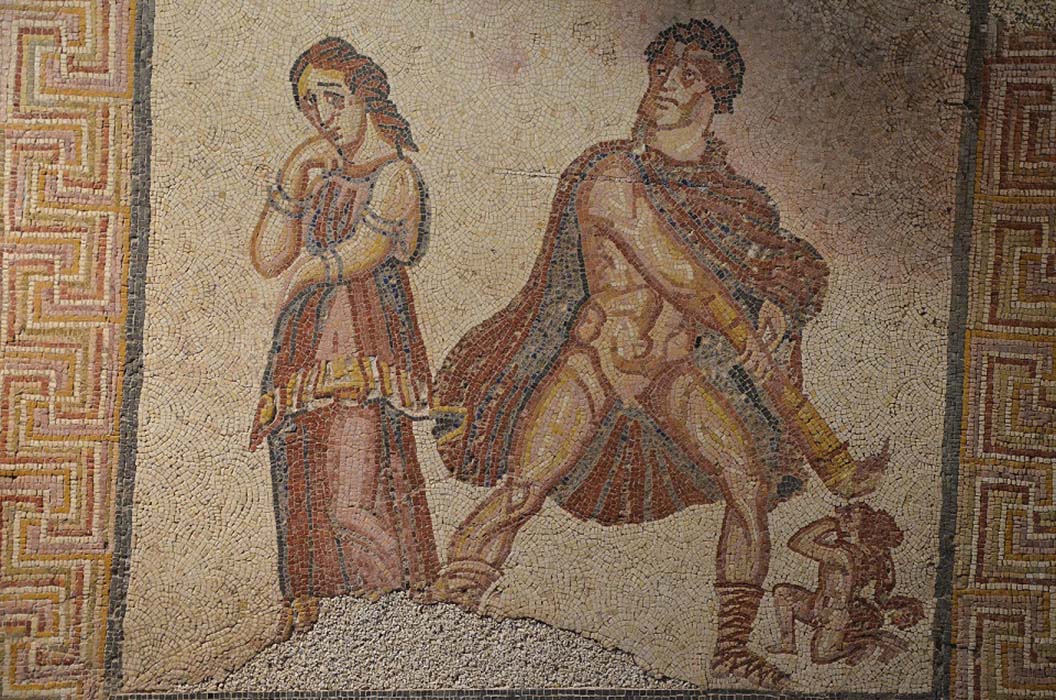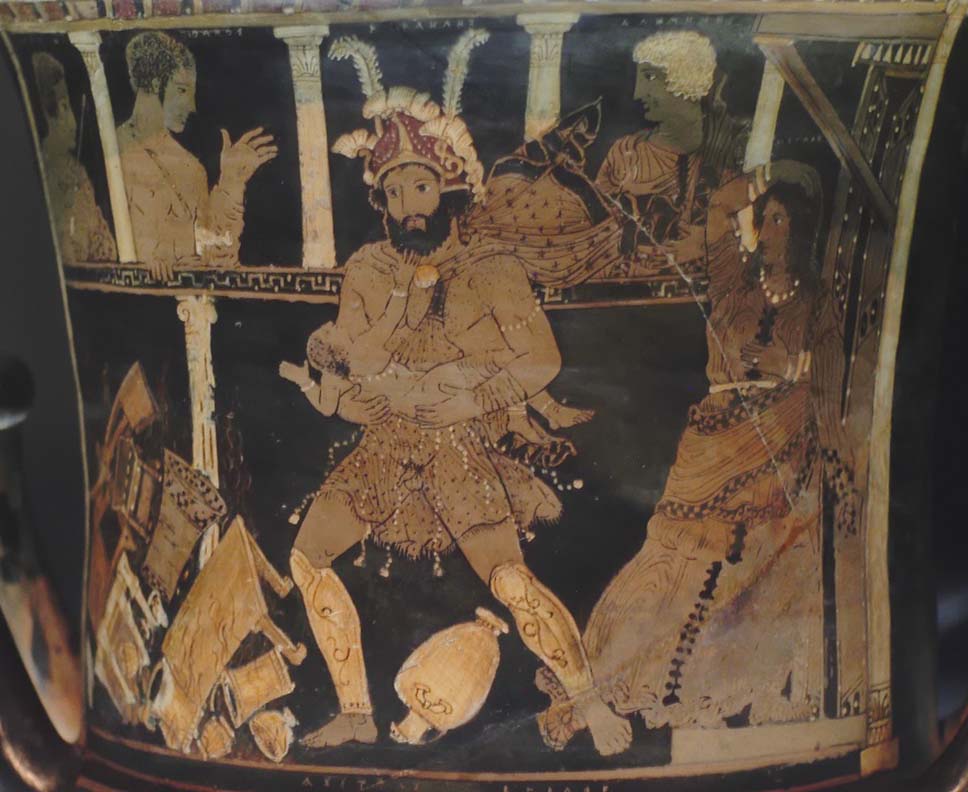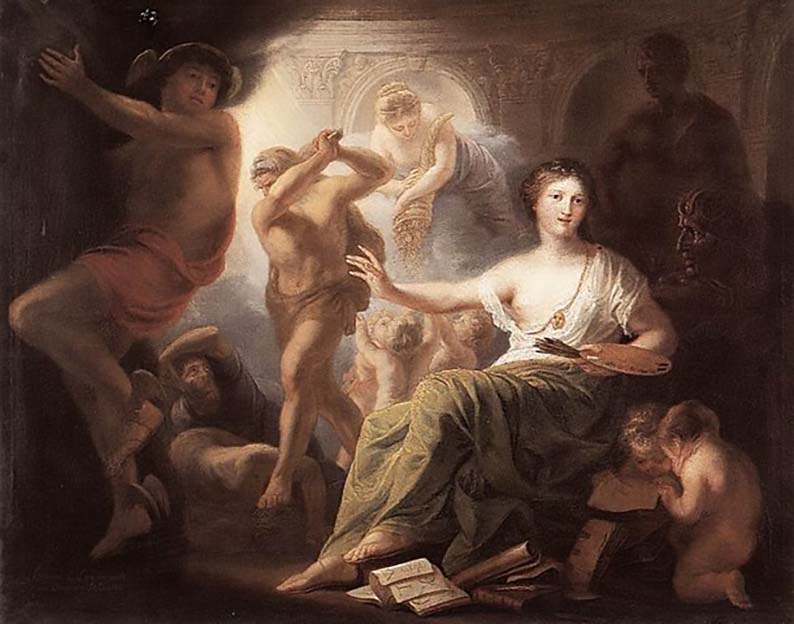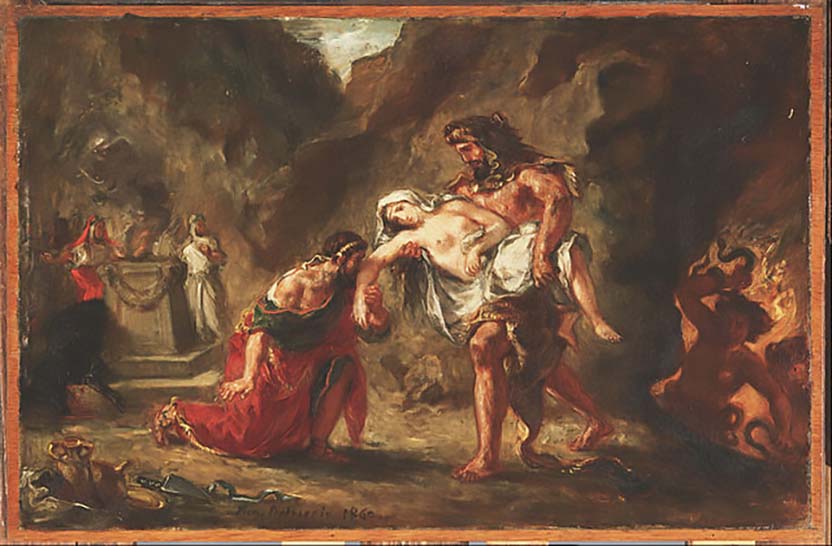Megara
READ MORE HERE:
In Greek mythology, Megara (Ancient Greek: Μεγάρα) was a Theban princess and the first wife of the hero Heracles.
Megara was the eldest daughter of Creon, King of Thebes, who was possibly the brother of Jocasta and uncle of Oedipus. If Creon is the same figure, Megara's mother is like Creon's wife Eurydice, and she would be the sister of Menoeceus (Megareus), Lycomedes, Haemon, and Pyrrha.
Accounts of the names and number of Megara and Heracles children vary based on the author.
According to the mythographer Apollodorus, Megara was the mother of three sons by Heracles named Therimachus, Creontiades, and Deicoon. Dinias the Argive included the three children named by Apollodorus, however, he also added a fourth named Deion.
Theban poet Pindar states that Megara bore Heracles eight sons. Alternatively, the Roman mythographer Hyginus named their sons as Therimachus and Ophites.
Their story begins as follows: Creon had offered sanctuary to Amphitryon and Alcmene years earlier, and thus the sons of Alcmene, Heracles and Iphicles had also grown up in Thebes.

As a young man, Heracles was already well on his way to become a famous hero when he encountered the emissaries of King Erginus of Orchomenus. These emissaries were on their way to Thebes to collect the tribute of a hundred oxen paid annually following the death of King Erginus’ father Clymenus , and the Theban defeat in a subsequent war.
Heracles was in no mind for Thebes to continue paying such a tribute, and sent the emissaries of Erignus back to their king, minus their ears and noses. This insult resulted in Erignus leading his army once again against Thebes; and in response, Heracles and Amphitryon led the Thebans on to the battlefield.
Heracles killed many and the Orchomenians were put to flight, although Amphitryon was said to have died during the battle. Subsequently though, the Orchomenians would have to pay an annual tribute of two hundred oxen to Thebes.
In gratitude, Creon decided to reward Heracles with a prize in the form of his daughter Megara, and so Heracles and Megara were wed. Megara would bear Heracles several children, although the names and number differ between the ancient sources, and between 3 and 8 children are named; most commonly though, four sons are named, Creontiades, Deicoon, Ophites and Therimachus.
Creon was not the only one who gave gifts to Heracles, for amongst the gods, Apollo gave to Heracles bow and arrows, Hermes provided a sword and Hephaestus a golden coat of chain mail. Hera though gave a totally different gift, for to strike back at Zeus’ illegitimate son she sent down Madness to Thebes.
A delusional Heracles would throw his own children into the fire, as well as two nephews, sons of Iphicles, and it was commonly said that Heracles also killed Megara at this time. The tombs of the deceased children of Heracles were said to be found in Thebes for hundreds of years afterwards, whilst, in Greek mythology, Megara was later observed by Odysseus in the Underworld.
Heracles was stopped from committing suicide, when he came back to his senses, by Theseus, and to atone from his crimes Heracles sought the advice of the Oracle of Delphi. The advice from the sibyl was to visit King Eurystheus and serve him from a period of time, completing Labours as directed.
What is more, there are various versions in regards to the story of Heracles (or Hercules) and Megara; always depending on the source.
One of this is the following - which is also the most common version: According to Seneca (Hercules Furens) and Euripdes (Heracles) Megara and Heracles actually spent many happy years together married, with the deaths of Megara and their children only occurring after the Labours of Heracles had been completed.

In this case Heracles returned to Thebes after capturing Cerberus to find that in his absence a usurper, Lycus, had taken the throne of Thebes, and was attempting to marry Megara.
Heracles of course kills Lycus, but then Hera sends down Madness upon Heracles, and thinking that his own children were the children of Lycus, Heracles kills them with his arrows, and then kills Megara thinking that she was Hera. Heracles would have continued upon his killing spree but for the intervention of the goddess Athena, who knocked him unconscious.
When Heracles came around, it was again Theseus who prevent Heracles from committing suicide in grief at having killed Megara and his children.
Finally, another version tells of how Megara was not killed by Heracles when the hero killed his children, but she was effectively divorced by Heracles because of the loss of their children. In this case Heracles then gave to Iolaus, his nephew, when he left Thebes; Megara would subsequently give birth to a beautiful daughter, Leipephilene.
Moreover, in Homer's Odyssey, while in the underworld, Odysseus sees Megara, but does not elaborate on her mythology beyond stating she was the daughter of Creon and the former wife of Heracles.
The Hellenistic poem Megara by an unknown author presented a dialogue at Tiryns between a mournful Megara and Heracles's mother Alcmene as the former grieves her children and Heracles's absence during his labours.

Sources
Homer, Odyssey
Apollodorus, Library, 2.4.11, 2.7.8
Stafford, Emma (2012). Herakles. New York, NY: Routledge. pp. 182–183.
Hyginus, Fabulae 31, 32, 72.
Apollodorus, Library, 2.4.11
Diodorus Siculus, Library of History, 4.11.1
Apollodorus, Library, 2.4.12
Euripides, Heracles 1001;
Hyginus, Fabulae 31.8, 241.
Apollodorus, 2.6.1.
Plutarch, Moralia "The Dialogue on Love / Erotikos / Amatoria", Loeb, V. XII, p.339
Silk, Michael Stephen (1985). "Heracles and Greek tragedy". Greece & Rome. 32 (1): 1–22.
Homer, Odyssey, 11.265













